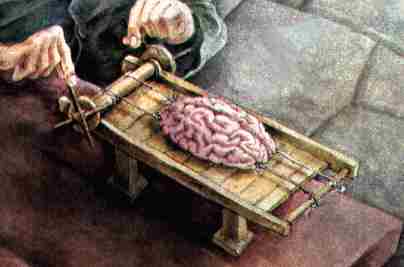faculties.
All kinds of cuts going on through here as he begins to delineate between the animal and the human. In effect, Sheridan constructs his human against the animal.
faculties.
All kinds of cuts going on through here as he begins to delineate between the animal and the human. In effect, Sheridan constructs his human against the animal.
ike all other animals,
I'm struck through here by how much Sheridan compares the human to the animal. Was this a popular idea at the time or would he have been laughed at?
of nature, in un
Big posthuman vibes through here -- a direct link is made to animal and human communication, noting the ways in which they're similar
and omit<; the use of the true signs of the passions, which are, tones, looks, and gestures.
This happens in poetry all the time. When we just read the words on the page (which we'll often do internally), we miss so much of the tonal and sonic qualities of the work. Listening to a poet actually read their work aloud is always fascinating, because suddenly you're thinking "oh, this was meant to be performed, and I'm supposed to actually feel these things."
and most
His emphasis on emotion reminds me of Aristotle, one of the few classical thinkers to take into account a person's emotions in a rhetorical context.
e ma
I can't remember who said this (maybe Stephen King?), but they described writing as a form of telepathy for exactly this reason: transferring ideas from one person to another. This idea is dramatized in Black Robe, a film about Jesuit missionaries in Canada during the 17th century. Worth a watch.
even make himself understood
comin out swingin
one's moral values will rise to the corresponding level.
This reminds me of the "Q" question, the assumption that just exposure to literature will inculcate an upstanding character: the banner model for humanities education.
very vuricty of o
Interesting here the interconnectedness of language and the body -- an embodied rhetoric. Physical gestures find root in classical rhetoric, but this seems to be the most explicit example of it in the readings we've encountered so far in this class.
As kmurphy1 has noted, there's also a move to contextualize rhetoric and language against growing interests in the (literal) mechanics of the body. Astell makes a similar pivot with her use of the word "Particles" to describe aspects of language and her machine-body metaphor.
secret springs and windings of our Hearts
the body as a clock-like mechanism, a machine -- also the Borg
noise
There's that noise reference that we noted in class, similar to Locke's use of the metaphor.
And perhaps the great secret or Writing is the mixing all these in so just a proportion that every one may tast what he likes without being disgusted by its contrary
This sounds like Augustine's point in De Doctrina Christiana, that it is in the mingling of various styles (his are something like grand, moderate, and low) that the greatest effectiveness is achieved.
Particles
This use of the word "Particles" reads as a signal toward language (or style, maybe) as an almost scientific process, as if she's syncing up language with the ongoing conversations in the burgeoning field of natural philosophy.
communicating
See Locke's second function of language: "for the communicating of our thoughts to others" (817). Although Locke is skeptical as to language's ability to accurately communicate these thoughts, apart from civic discourse. But Astell is referring here to meaning related to "those Truths."
Alas, Human Knowledge is al best defective. and always progressive.
I'm struck by how much this statement rejects Locke's idea that simple ideas and concepts were related to universal ideals which all humans understood. Here Astell notes that our knowledge "is at best defective," a move that seems almost fatalistic if not for the additional qualifier of "always progressive." So we'll never know everything (or anything) perfectly (whatever that means), but you can still grow in knowledge.
perishing in a glorious attempt
also known as grad school
rack their brains,
This expression is much older than I assumed. I guess it comes from a kind of torture rack?

Censorious
This resonates with Cavendish: "But this Age is so Censorious, that the Best Poets are found Fault with."
hierarchical social order
We talked about this a lot in Rachel's class last semester -- how hierarchical institutions have played a role in social movements for equality. Examples include the Civil Rights movement, the Black Panthers, and Beyonce.
Almost all of these spheresof mental activity have as their single goal the inquiry after truth
I like that all of these Enlightenment thinkers at least had a goal in mind for what they were doing. I mean, we can (and probably should) disagree with how fundamental and exclusionary their definition of truth was, but it seems we continually have trouble (especially in the humanities) articulating why we study the things we do, like we're afraid of defending ourselves because then we might have to say something definitive. Or agree on something. Reminds me of the "Q" question piece.
imilalc,
He mentions imitation twice in this paragraph, which was one of the dominant methods of instruction in rhetoric up through the Enlightenment. What does imitation look like today? I'm curious as to what that might (or does) look like.
as for as necessary,
Interesting here the notion that perhaps there's only a certain amount of knowledge humans need to know.
reflection
It's interesting that reflection is emphasized in Hume's empiricism. I guess proper reflection is what actualizes the experience?
repetition of the cycle of stage
Hmmmmm.... so which stage are we in now?
including the universal language from which all languages spring
Following lhm8's Fenollosa comment earlier, this was an idea that survived into the early 20th C., as writers like Fenollos and Ezra Pound looked to the Chinese character as a more "natural" state of language, something closer to a universal meaning.
were simply too poor to hire instructors who could teach i
Amazing. This is a noteworthy comment on how economics can also shape knowledge. It's still a hotly debated issue today, with the whole private/charter/public school discourse circling around the intersection of money, resources, and, curriculum.
Rhetorick."
What's with all this either/or stuff? In Augustine's De Doctrina Christiana, he articulate three categories of style (subdued style, moderate style, and grand style), and argues that its the interplay of the three that make for the most effective preaching.
neo-Ciceronians,
What if we called it neo-humanism?

and it is not Probable, that Forcible Arguments or Perswasions can be Contain'd in two or three Lines of VVords;
Something obviously the Russians do not believe.
but by the Just and VVife, which will be a Satisfaction to me.
I feel like I should add a similar disclaimer to all of my essays: "Look, I'm not going to please everybody, and if you're not on the same page as me, then there's the door." In a way she's forming her audience within the writing itself, so that what appears to be a series of sweet slams is actually a strategic method of telling the reader how to receive the text.
vitalist
Vitalism is "'the belief that "living organisms are fundamentally different from non-living entities because they contain some non-physical element or are governed by different principles than are inanimate things.'"
If we allowed the vitalist premise, we could point to someone like Siegert who might argue that, even if there is a difference between organic and inorganic, they each constitute the other; the "living" and the "non-living" collaboratively make up a system of cultural techniques, which "link humans, things, media and even animals" (abstract 48). Like his walls and fences examples.
The Blazing World
from wikipedia: "Blazing World is a fanciful depiction of a satirical, utopian kingdom in another world (with different stars in the sky) that can be reached via the North Pole."
Already sold.
earliest examples ofscience fiction

pardons twenty absurdities and defects for one elevated or pathetic stroke.
I feel like this is where I live -- thank you for noticing me Hume


they must acknowledge a true and decisive standard to exist somewhere, to wit, real existence and mat� ter of fact
Hume and Locke seem to agree here -- they both feel that there exists some kind of external, fixed reality (observed in nature), and if we all just practiced enough we could see it
eauty
This is a great little summary of what he's outlined so far.
must place 1,Jl>'u.,<I himself in lhe same situation as the audience, in order to form a true judgment of the oration.
Me: But Hume, why can't I write about Las Meninas without mentioning Foucault?
Hume: My child, "before [you] enter upon the subject, [you] must endeavor to conciliate [the peer reviewer's] affection, and acquire their good graces."
Me: But why can't we just move on?!?!
Hume: My child, you "must place [yourself] in the same situation as the audience, in order to form a true judgment."
Me: Yeah I'm just gonna cut the reference.
I mean, you guys might have read that differently.
perused by us, and be surveyed
his use of the word "perused" and "surveyed" seems to suggest Hume advocates the exposure model of practice...
So advantageous is practice to the discernment of beauty,
I originally read practice in this context as exposure, the idea that if you just study a lot of literature you'll develop a taste for the good stuff (basically the dominant model of lit studies). But now I'm wondering if Hume saw practice as actually doing the art. Like, instead of just studying poetry, I actually went out and wrote some poetry. My taste, then, would develop through a combination of external and internal experience; it would be practice of both input and output.
foreigners
interesting here the authority given to critics that approach the work from an explicitly different worldview -- it speaks to Hume's belief in a kind of monolith aesthetic -- in other words, great art is great art and would be recognized as such even by someone outside the culture
they are found [ /. to please, they cannot be faults; let the pleasure, which they produce, be ever so unexpected and unaccountable
This is a big claim, perhaps even more so now with how pervasive our mass culture is. Here Hume forces the critic to admit that taste can be inexplicable.
each mind perceives a differentbeauty.

hari-
There's a strong call for the primacy of experience here, likely stemming from Hume's emphasis on an epistemology generated through sensory input. In this instance, the concept of charity is only realized through acts of charity, not simply the symbolic gesture of the word through vocalization.
Taste,
I seriously thought we were talking about taste in the context of food. I mean I guess it's not unrelated.
as Locke had claimed
Didn't Locke claim the opposite? I'm confused.
.
I actually wasn't aware of the psychological associations with "histrionics." Being a nerd who watches commentaries for animated films, histrionics is often a term used to describe an animator's bad habit of constantly making the model move. You'll see this a lot in traditionally animated films, where motions are exaggerated -- it's typically done because our eye reads a non-moving animated character as flat and lifeless. I know gestures were a key part of classical rhetoric, so is this what Hume is advocating for here, an increased focus on the rhetoric of physicality?
dry truth and real knowledge,
Well, Locke, when you call it "dry truth and real knowledge," is it any surprise "wit and fancy" win out?
chimeras
I just spent way too long searching for it and not even finding it, but I think chimeras have showed up before in our readings.
who had noth-ing in his study but the bare titles of books, with-out possessing the contents of them
ouch -- I've been Locke-slammed
it would become us to be charitable one to another in our interpretations or misunder-standings of those ancient writings; which, though of great concemment to be understood, are .l.i~ble to the, unavoidable difficulties of speech, which (if we except the names of simple ideas, and some very obvious things) is not ca-pable, without a constant defining the terms, of conveying the sense and intention of the speaker, without any manner of doubt and uncertainty to the hearer.
This seems like a very compassionate approach here.
like the medium through which visible objects pass
like an apparatus...
seven

no one has authority to determine the signification of the word gold
I'm struck through here (and the liquor example) how prescient Locke's inquiries are for our own investigations into rhetoric and the question of "what is human?" It feels like he's anticipating Barad's argument that each definition of gold -- its color, its weight, its malleableness, etc. -- creates a cut, a boundary around what gold means for each person that cares to define it. Barad sees these "local determinations" not as final but as fluid, even while being exclusionary (821). Locke is keying in on these exclusionary definitions and the problems they might pose to an empirical approach.
what the word liquor stood for
Locke the Rhetorician
Who of all these has established the right signification of the word, gold? Or who shall be the judge lo determine
These still feel like very important questions.
by these elucidations given rise or increase to his doubts, and drawn obscurity upon the place
Following Dr. Rivers's postmodern note, this reminds me of our discussion in class related to Nietzsche, how we're so often trained to assume that the text means something other than the text itself, and we search for the "true" meaning buried underneath the text, perhaps in the author's subconscious. I'm reminded to of a comment made in Dr. Johnston's poetry class, that we as critics don't spend enough time on simply characterizing texts; in place of depth arrived at through analysis, we should strive for complexity in our attempt to take the words on the page at their word.
mixed modes
I think I'm figuring out the mixed modes thing. For Locke, a "mixed mode" refers to abstraction, words that attempt to represent concepts not found in the natural world. Or at least, there's not a one-to-one, sign-to-signifier relationship in the natural world for concepts like good or bad.
yet the complex collective idea which every one thinks on or intends by that name, is apparently very different in men using the same language.
This sounds like Lanham's strong defense of rhetoric, the idea that meaning is communally negotiated and anchored to socio/political/cultural contexts. Although here Locke is not happy about that.
mi.red mode
Maybe I missed this, but what does he mean by "mixed modes"?
imperfection
see Barad: "Language has been granted too much power" (801). It's interesting to think of Locke here as a kind of antecedent to the linguistic turn, when language and its sign/symbol relationship was complicated. I wouldn't say they're the same, just that the move to call into question the ability of language to accurately represent the world is similar. Although in a kind of paradox Locke seems to be advocating for a more exact language, despite his own concession that such a thing might not be possible.
for then he cannot fail of having his meaning understood, wherein consists the right use and perfection of language.
I like Locke's notion that "the right use and perfection of language" is to have "meaning understood" (817). This still seems to be a notion we hold onto (CLARITY -- it's certainly one I strive for anyway), though we'd probably differ on his assertion that our words are just transcriptive/descriptive tools. See Barad's critique of representationalism.
Locke

we are a part of that nature we seek to understan

For Bohr, apparatuses are particular physical arrangements that give mean-ing to certain concepts to the exclusion of others;
Is there a way we can think of rhetoric and/or posthumanism as metaphorical apparatuses? Discursive tools through which "meaning" or the "human" becomes diffracted, and then we interact according to the question "which one?"
Semantic contentfulness is not achieved through the thoughtsor performances of individual agents but rather through particular dis-cursive practice
Is this the Strong Defense of rhetoric again? Meaning arrived at not through empiricism but a communal negotiation?
If “humans”refers to phenomena, not independent entities with inherent propertiesbut rather beings in their differential becoming, particular material(re)configurings of the world with shifting boundaries and properties thatstabilize and destabilize along with specific material changes in what itmeans to be human, then the notion of discursivity cannot be foundedon an inherent distinction between humans and nonhumans
This has Annihilation written all over it. I basically understand the world through SF metaphors.

. Agency is not an attribute but the ongoing reconfigurings of theworld.
So, agency is a series of ongoing interactions, not some singular phenomena or characteristic? Is that an accurate paraphrase?
A posthumanist account callsinto question the givenness of the differential categories of “human” and“nonhuman,” examining the practices through which these differentialboundaries are stabilized and destabilized.
I'm tagging this for my own benefit, really, because here Barad offers an excellent, succinct distillation of this posthumanist thing.
Judith Butler
And here's Butler. I've only just read these Important Thinkers names and honestly I've never seen a picture of either Foucault or Butler. So here they are.

Michel Foucault
We need a picture of this guy

For ex-ample, does scientific knowledge accurately represent an independentlyexisting reality? Does language accurately represent its referent? Does agiven political representative, legal counsel, or piece of legislation accu-rately represent the interests of the people allegedly represented?
I love the triple-slam here. Science, language, the law (specifically representative democracy, in this case): all of these rely on representations to communicate, therefore all are suspect.
when materiality itself is always alreadyfigured within a linguistic domain as its condition of possibility?
Is this what Rickert was doing with his discussion of the cave paintings?
power
This claim is articulated pretty strongly in Gorgias's Encomium of Helen. The piece is a kind of thought experiment where Gorgias attempts to defend Helen. He points out that language (or speech) is "a powerful lord, which by means of the finest and most invisible body effects the divinest works: it can stop fear and banish grief and create joy and nature pity" (sec. 8). Part of his defense, then, is that Helen almost didn't have a choice; the speech was too powerful, god-like even. I found a .pdf copy of it here: http://myweb.fsu.edu/jjm09f/RhetoricSpring2012/Gorgias%20Encomium%20of%20Helen.pdf
nature/culture framework in terms of the real and the sym-bolic.
Perhaps unrelated, but I'm reminded here of a passage from Cormac McCarthy's The Crossing -- "The world has no name, he said. The names of the cerros and the sierras and the deserts exist only on maps. We name them that we do not lose our way. Yet it was because the way was lost to us already that we have made those names. The world cannot be lost. We are the ones. And it is because these names and these are our own naming that they cannot save us. That they cannot find for us the way again" (387).
I like this quote because it makes explicit the real/symbolic distinction that we apply to nature, similar to Siegert's music example. The world simply exists, but we interact with it symbolically, assigning names and numbers to denote physical locations or geographic/geological features.
hermeneutic
Hermeneutic: "Of, relating to, or concerning interpretation or theories of interpretation" http://www.oed.com.ezp.slu.edu/view/Entry/86256?rskey=wwSw5E&result=1&isAdvanced=false#eid
he materialities of communication
This reminds me of Barad's focus on an apparatus, how the tools themselves -- "'the materialities of communication'" -- impact our understanding of reality in fundamental ways, actually changing how we understand the world -- the whole light is either a particle or a wave, depending on how you interact with it.
we are a part of that nature we seek to understan

For Bohr, apparatuses are particular physical arrangements that give mean-ing to certain concepts to the exclusion of others;
Is there a way we can think of rhetoric and/or posthumanism as metaphorical apparatuses? Discursive tools through which "meaning" or the "human" becomes diffracted, and then we interact according to the question "which one?"
Semantic contentfulness is not achieved through the thoughtsor performances of individual agents but rather through particular dis-cursive practice
Is this the Strong Defense of rhetoric again? Meaning arrived at not through empiricism but a communal negotiation?
refers to phenomena, not independent entities with inherent propertiesbut rather beings in their differential becoming, particular material(re)configurings of the world with shifting boundaries and properties thatstabilize and destabilize along with specific material changes in what itmeans to be human
This has Annihilation written all over it. I basically understand the world through SF metaphors.

Agency is not an attribute but the ongoing reconfigurings of theworld.
So, agency is a series of ongoing interactions, not some singular phenomena or characteristic? Is that an accurate paraphrase?
A posthumanist account callsinto question the givenness of the differential categories of “human” and“nonhuman,” examining the practices through which these differentialboundaries are stabilized and destabilized.
I'm tagging this for my own benefit, really, because here Barad offers an excellent, succinct distillation of this posthumanist thing.
udith Butler
And here's Butler. I've only just read these Important Thinkers names and honestly I've never seen a picture of either Foucault or Butler. So here they are.

Michel Foucault
We need a picture of this guy

power
This claim is articulated pretty strongly in Gorgias's Encomium of Helen. The piece is a kind of thought experiment where Gorgias attempts to defend Helen. He points out that language (or speech) is "a powerful lord, which by means of the finest and most invisible body effects the divinest works: it can stop fear and banish grief and create joy and nature pity" (sec. 8). Part of his defense, then, is that Helen almost didn't have a choice; the speech was too powerful, god-like even. I found a .pdf copy of it here: http://myweb.fsu.edu/jjm09f/RhetoricSpring2012/Gorgias%20Encomium%20of%20Helen.pdf
For ex-ample, does scientific knowledge accurately represent an independentlyexisting reality? Does language accurately represent its referent? Does agiven political representative, legal counsel, or piece of legislation accu-rately represent the interests of the people allegedly represented?
I love the triple-slam here. Science, language, the law (specifically representative democracy, in this case): all of these rely on representations to communicate, therefore all are suspect.
hen materiality itself is always alreadyfigured within a linguistic domain as its condition of possibility?
Is this what Rickert was doing with his discussion of the cave paintings?
I want to plea for monistic affirmativepolitics grounded on immanent inter-connections and generative differ-ence
This strikes me as a key distinction between postmodernism and posthumanism. Postmodernism can be thought of as post-utopian, while posthumanism works toward an affirmative, generative future. I don't know if posthumanism is utopian, per se, but it doesn't seem to be dystopic in the way that postmodernism often is.
super-human meta-rationalist enti

de-familiarization
I really admire these qualitative criteria here. I imagine these concepts will prove useful going forward with this class.
The driving force for knowledge production is therefore not the quest fordisciplinary purity, or the inspirational force of radical dissent, but ratherthe modes of relation these discourses are able and willing to open up to.
Is "'supra-disciplinary'" the same as interdisciplinary, or is she avoiding the term for a reason?
What prevents it frombeing just an epistemic form of accelerationism?9
I'm glad she considers this question, because I didn't really know how to ask it.
The interplay between the present as actual and the presentas virtual spells the rhythms of subject formation.
Following their Foucault reference, this reminds me of his "Self Writing" piece. The self is formed through the physical, material act of writing -- "the present as actual" -- and the transmission of self across space and time through the letter -- "the present as virtual". The subject, then, emerges against the interplay of the material and the virtual.
ucault’s genealogicalmethod shows that it is at the moment of its dissolution that ‘Man’emerges as a thinkable catego
Identity emerging at a moment of ontological crisis.
Ex-Man

they assist us in the process of learning to thinkdifferently about ourselves, in response to the complexity of ourtimes.
Nick Sousanis makes a similar point in his book Unflattening. His argument is that the comic form offers us a way to re-imagine ourselves that is attuned to both networked and isolated interactions.

ame’s only directive
Has anyone else seen this movie? I ask because it didn't seem to me that Cronenberg sees this whole reality-bending thing as a positive aspect in the human experience, and I want to know how others reacted to it. For me, the film is very disturbing and unsettling in its implications for how we navigate reality. I might be misremembering though.
ideocassette
A black, brick-like piece of technology that housed videotape, defined as "magnetic tape for recording and reproducing visual images and sound."

, resentment toward capit
This strikes me as a remarkably dehistoricized and depolticized reading of what actually constitutes "leftist" critiques of capital. Nealon also seems to be articulating Jameson's concept of "cognitive mapping," but Mucklebauer and Hawhee have already dismissed him (I mean, I haven't actually read Nealon's piece, so I could be way off). I'm just pissy now.
movement
I mean, Cardi B already knew this. https://www.youtube.com/watch?v=PEGccV-NOm8
ut cap
Are they making a distinction between capital (money) and capitalism (an ideology/economic system)?
as is often claimed, rhetoric truly wants to become apractical art?
Is this true? This seems to be the project that people like Aristotle, Cicero, and Quintillian were concerned with (and its one that current writing textbooks advocate for), but the readings from last week seemed to push against any kind of prescriptive approach to rhetoric. Can you have "a practical art" without some kind of anchored definition? And who is it practical for?
nstead, these biologic-machinic complexes become webs of neurons andsoftware engaged in specific exchanges of information and energy
Cronenberg also plays with this idea in his remake of The Fly, although Goldblum's transformation into a fly-human hybrid is a decidedly horrific experience. Something that Mucklebauer and Hawhee don't mention is that Cronenberg's eXistenZ metaphor also reads as a fairly damning critique of an emerging online game culture.
exchange of soul service
brilliant -- can "soul service" be one of the 1900 learning outcomes?
rather, present with a kind of immediate, almost physical presence
I like Foucault's emphasis on the tactility of the letter, how the materiality of the thing itself carries meaning. To drop Benjamin in again, the letter has an aura, an ineffable quality that is ultimately reduced through any kind of reproduction through mediation.
one always needs the help of others in the soul’s labor upon itself
This is kind of a beautiful sentiment.
The hupomnemata contribute one of the means by which one detaches the soul from concern for the future and redirects it toward contemplation of the past.
I'm reminded here of Walter Benjamin's note on the "Angelus Novus" illustration: "His eyes are staring, his mouth is open, his wings are spread. This is how one pictures the angel of history. His face is turned toward the past. Where we perceive a chain of events, he sees on single catastrophe which keeps piling wreckage upon wreckage and hurts it in front of his feet. The angel would like to stay, awaken the dead, and make whole what has been smashed. But a storm is blowing from Paradise; it has got caught in his wings with such violence that the angel can no longer close them. This storm irresistibly propels him into the future to which his back is turned, while the peril of debris before him grows skyward. This storm is what we call progress" (Theses on the Philosophy of History).
Seneca
Cicero also identifies writing as essential in De Oratore. It crops up a few times, but one of them is in Book I, section 150 or so.
as
The claim here that "the rhetorical occasion always includes an audience" seems challenged by Rickert, who argues for a rhetorical situation involving an isolated shaman painter in a dark cave.
strange reality
Following the VanderMeer reference, I see a lot of connections between this piece and Annihilation, especially the idea that "words hold things," and how le Guin draws our attention to "the bottle as hero ... a thing that holds something else." The novel is definitely a sewing-oats-and-gathering-things story over a bash-aliens-with-indispensable-whackers story.
indispensable whacker,
LeGuin is so brilliant -- can we just call all blunt instruments "indispensable whacker[s]" now?
in the movie
Here's the scene she's talking about: https://www.youtube.com/watch?v=mI3s5fA7Zhk
Interestingly, the floating-phallus motif is carried a little further, eventually taking the form of a floating pen in a shuttle cabin (the score here isn't the original, and the pen starts at 2:00, but this sequence immediately follows the above match-cut): https://www.youtube.com/watch?v=48rh85d4yTI
then it becomes plain that rhetoricity, in whatsoever forms it takes, will recruitfrom whatever is available to it.
To add to Dr. Rivers's note on Aristotle, the philosopher famously defined rhetoric as the "ability to see the available means of persuasion" (I'm not quoting this exactly from a source in front of me, but it's pretty close to something like this)
ee it instead as extended out and threadedthrough material objects and practices
To relate this to writing, writing isn't simply a transcription tool for the brain; the process (the tools used to compose, the revisions, the space you work within -- the "material objects and practices") is itself generative of new modes of inquiry and ideas.
We see that cognition is thus ecological: it is extended out and enmeshed with symbologyand techniques, material features and aids, and environing forces, all of which in turn forma constantly evolving, shifting dynamic.
This sounds like Jared Diamond's claim in Guns, Germs, and Steel, the idea that geographic placement determines so much of how humans adapt and develop.
which is to say, a cosmology
This is an intriguing rhetorical approach. I'm curious about how one might use this methodology on an author like Philip K. Dick, who, especially in his latter years, experienced some powerful visions (likely with the aid of psychotropic drugs). He wrote a lot of it down in both his VALIS trilogy and a book published posthumously titled The Exegesis of Philip K. Dick. Also W.B. Yeats could be an interesting case study.
France’sChauvet Cave
There's a great documentary from Warner Herzog on these famous cave paintings, dramatically titled Caves of Forgotten Dreams. It's currently on Netflix.
rhetoric drink
I like the idea of rhetoric drinking things
Anthropocene
My understanding of this term is that it refers to the epoch or age in which human beings began impacting their environment. However, I didn't think that its origins were settled. Is there an agreed-upon originating point for the Anthropocene, and is this a scientific designation?
I will complicate both narratives, showing that each depends on earlier devel-opments.
classic scholarly move -- I'm appreciating the repeated use of the personal "I" through here. I've noticed (both here and in Paul's class) that scholars of rhetoric seem more amenable to personal insertion into academic writing.
Rather, it coalesces out of multiple cultural, material, andsemiotic strands that are mutually entangled and coevolving.
What's the difference here between rhetoric and cultures writ large? Rickert's formulation seems to allow for any number of interchangeable elements to be plugged in for rhetoric, which feels appropriate considering the expansiveness of the discipline. Perhaps because rhetoric is so explicitly linked with language, communication, and intervention, the two (rhetoric and X) cannot be separated.
Q"

people working at Apple
read: the executives and high-salary concept engineers "found that it engaged far more of the human personality than the highly ritualized and spiritualized competitive atmosphere at Pepsi" -- let's not forget that Pepsi and Apple are both hugely successful businesses that profit from low-wage labor; whether they're "second wave" or "third wave," the economic outcome is the same: a product consumed by millions of people. I take Lanham's point that the latter emphasizes form in relation to content and flexibility over rigidity, which (debatably) produces a better product (though I agree that a curriculum founded on these principles can produce a better student), but I question the utility in the corporate analogy here. What makes an Apple-flavored student superior to a Pepsi-flavored one? If we accept Lanham's metaphor, aren't both companies successful? Probably splitting more hairs here, but I'm always wary when we start using economic language to describe aspects of life not explicitly related to the market. To his credit Lanham prefaces this paragraph with a nod to not "sentimentalizing the life of a volatile corporation."
intellectual wasteland
ah, high school
prolegomenon
Prolegomenon: "a critical or discursive introduction to a book"
Rhetoric is merely a tool, no bad thing in itself. Or rather, it is the box of tools for per-suasion taken together, available for persuaders good and bad
Does this sound like the argument espoused by gun rights activists to anyone else?
the calcu-lation of uses and applications that might be made of the vastly increased available means in order to devise new ends and to elimi-nate oppositions and segregations based on past competitions for scarce means. (24)
Does this sound like Mark Zuckerberg's idealism before it devolved into a data-mining project in the service of neoliberal economics?
sprezzatur
Sprezzatura is a kind of practiced nonchalance, the play-it-cool mentality that conceals the strategic inner rhetorician. Think Varys in Game of Thrones. A cooler example occurs in Skyfall , in which James Bond descends through the roof of a moving train car while said roof is basically torn off and then immediately fixes his cufflinks like nothing happened. Perhaps not sensible from a narrative point of view, but certainly rhetorically appropriate for the audience and very sprezzatura. Another Renaissance example that we read in Dr. Lynch's Rhetoric I class is Christine de Pizan's The Treasure of the City of Ladies, which is like Castiglione's book if the audience were women of the court.
determinative, essentially creative
There's a weird tension here for me between the idea of rhetoric as "determinative, essentially creative." I'm perhaps inserting a reading that focuses too much on the similar-but-different word "determinate" rather than "determinative." I don't object to the creative aspect, but identifying something as "determinative" seems to suggest a kind of rigidity antithetical to the fluid, contextual nature of rhetoric that Lanham outlines. I might just be spitting hairs here, but it struck me as odd.
paideia
A paideia is similar in concept (though not identical to) to our idea of a curriculum or pedagogy; it's essentially a course of study that a Greek youth would begin at a young age and continue into their late teens. Interestingly, it is a holistic program, one that encompasses all areas of intellectual and physical pursuit. Quintilian's 12-volume Institutes of Oratory, referenced here, is a kind of instruction book for such a program. As Lanham notes, the goal here was to ultimately cultivate a virtuous, learned man that might participate productively in political life.